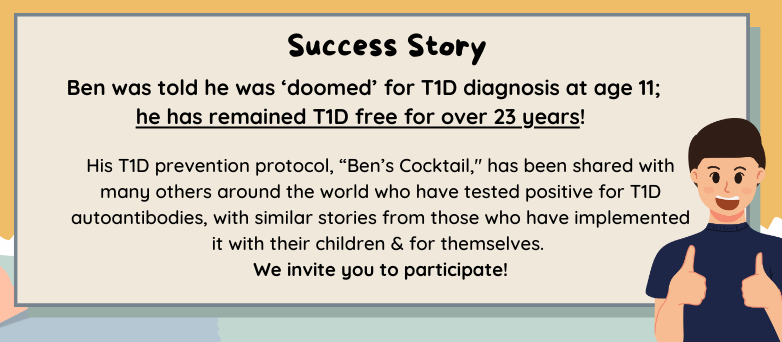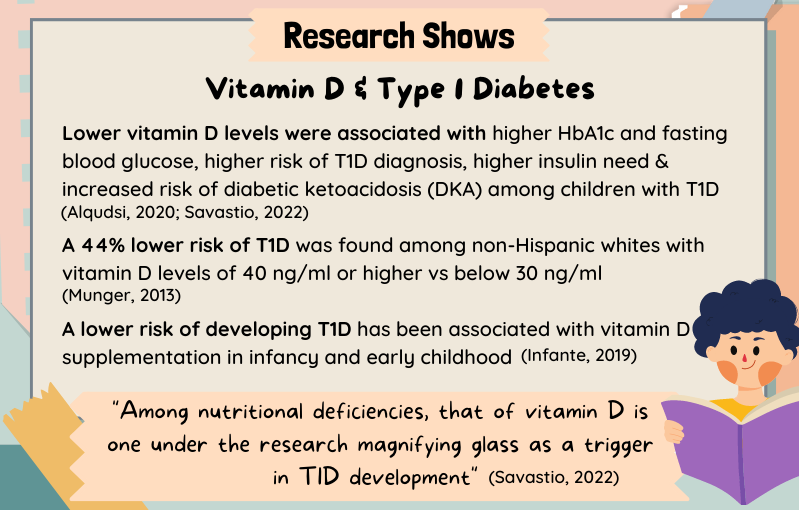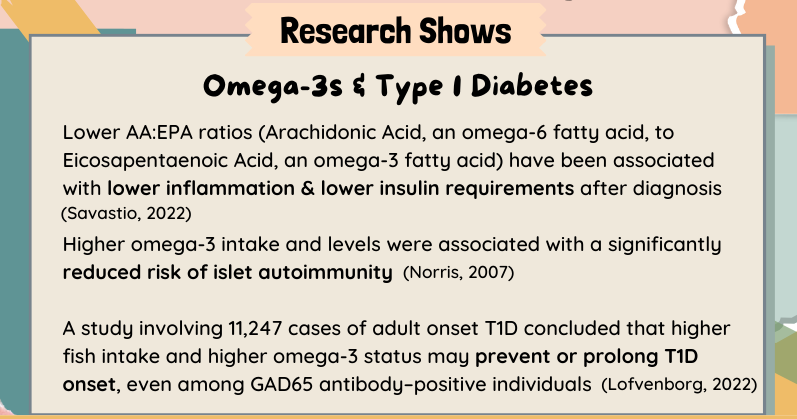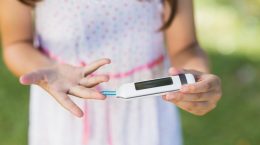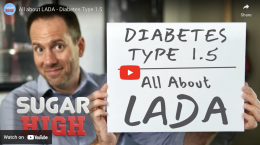Published on April 25, 2023
Learn more about the protocol that has been helping to delay and prevent T1D diagnosis, implemented as part of an official project of GrassrootsHealth. Download & share the infographic below.
Key Points
- Maintaining a vitamin D blood level of 40-60 ng/ml (100-150 nmol/L) and an AA:EPA ratio below 3 has been associated with decreased inflammation, which has been linked to lower levels of T1D autoantibodies, and therefore lower risk of T1D development
- A case report of an 8 year old new onset T1D demonstrated effectiveness of vitamin D and omega-3 fatty acid testing and supplementation as a safe and cost-effective strategy to assist in halting the progression of T1D
- This T1D Prevention protocol has now been shared with many others around the world who have tested positive for the T1D autoantibodies, and we are receiving similar stories from those who have implemented it with their children, and for themselves. We now invite anyone who shares this experience, or who would like to give this protocol a try, to become part of our T1D Prevention Study.
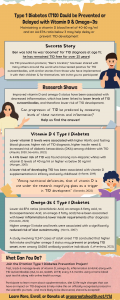 Type 1 diabetes (T1D) is an autoimmune disease that has historically been thought of as a childhood-onset disease, hence referred to as ‘juvenile onset’ diabetes. However, a 2022 review by Harding et al. demonstrated that the incidence of adult-onset T1D (among those 20 years or older) is substantial and is often misdiagnosed as type 2 diabetes.
Type 1 diabetes (T1D) is an autoimmune disease that has historically been thought of as a childhood-onset disease, hence referred to as ‘juvenile onset’ diabetes. However, a 2022 review by Harding et al. demonstrated that the incidence of adult-onset T1D (among those 20 years or older) is substantial and is often misdiagnosed as type 2 diabetes.
Whether discussing the research on type 1 diabetes or type 2 diabetes, evidence has shown that maintaining a vitamin D blood level of 40-60 ng/ml (100-150 nmol/L) and an AA:EPA ratio below 3 may help delay or prevent the development of either, likely due to the roles of vitamin D and omega-3s in managing inflammation and regulating the immune system.
A protocol involving education, measurement of, and supplementation with vitamin D and omega-3s is now being implemented to help decrease the progression of T1D among those at risk. Take action for yourself or someone you know who may be concerned about Type 1 Diabetes. Share this information with them today!
Learn More About the T1D Prevention Project
Can Type 1 Diabetes be Prevented? Help Us Find the Answer
Type 1 diabetes is recognized as an autoimmune disorder, triggered when antibodies created by a person’s own immune system (autoantibodies) attack the cells of the pancreas. These T1D islet cell autoantibodies are associated with the development of T1D, and their presence can be used as markers of the process that can cause type 1 diabetes. Improved vitamin D and omega-3 status have been associated with decreased inflammation, which has been linked to lower levels of T1D autoantibodies, and therefore lower risk of T1D development.
Can progression of diabetes can be predicted by measuring levels of vitamin D, omega-3s, and inflammation?
Help us find the answer – see below.
Success Story: A 23+ Year Delay (and still T1D Free)
At age 11, Ben tested positive for two of the type 1 diabetes (T1D) autoantibodies, which were present along with high levels of inflammation in his blood. Because of the presence of these autoantibodies, Ben’s doctors were convinced that he would be diagnosed with T1D within the next few months.
Determined not to allow this to happen, Ben’s mom dug into the research and discovered a connection between inflammation and T1D, and consulted with researchers who had proposed a role of fish oils in delaying T1D diagnosis. Based on what they said, she developed a ‘cocktail’ of supplements and started both Ben and his sister on the protocol, which includes high doses of omega-3 fats and vitamin D.
Download & Share Full Infographic Here
“Ben’s Cocktail” has now been shared with many others around the world who have tested positive for the T1D autoantibodies, and we are receiving similar stories from those who have implemented it with their children, and for themselves. We now invite anyone who shares this experience, or who would like to give this protocol a try, to become part of our T1D Prevention Study, so that we can measure, track, and publish the findings to help make this an officially recognized protocol in the scientific journals – and more likely to be discovered, shared, and accepted.
Learn more below about the T1D prevention protocol he follows (called “Ben’s Cocktail”), now implemented as part of an official project of GrassrootsHealth.
Learn More About the T1D Prevention Project
What the Research Says About Vitamin D & T1D
- A 2022 systematic review found a strong association between lower vitamin D levels and the development and diagnosis of T1D, concluding that “high-level evidence that adequate vitamin D status in early life reduces T1D risk.” (Yu, 2022)
- T1D children who supplemented with vitamin D had lower levels of fasting blood glucose (FBG), mean blood glucose (MBG), HbA1c, mean total daily insulin dose (TDI), lower TNF-a, and better residual beta cell function (Panjiyar, 2018; Nwosu, 2022; Nwosu, 2024)
- Lower vitamin D levels were associated with higher HbA1c and fasting blood glucose scores, higher risk of T1D diagnosis, higher insulin need, and increased risk of DKA among children with T1D (Alqudsi, 2020; Savastio, 2022)
- One study found that non-Hispanic whites with vitamin D levels of 40 ng/ml or higher had a 44% lower risk of T1D compared to those below 30 ng/ml (Munger, 2013)
- Vitamin D supplementation in infancy and early childhood has been associated with lower risk of developing T1D (Infante, 2019)
Download & Share Full Infographic Here
“Among nutritional deficiencies, that of vitamin D is one under the research magnifying glass as a trigger in T1D development” (Savastio, 2022)
Did you know? A higher incidence of T1D is found in regions of higher latitude (with less UVB from sun for making vitamin D) and diagnosis peaks during seasons when UVB is lowest (winter is the peak low) (Infante, 2019)
What the Research Says About Omega-3s & T1D
- Lower AA:EPA ratios (Arachidonic Acid, an omega-6 fatty acid, to Eicosapentaenoic Acid, an omega-3 fatty acid) have been associated with higher vitamin D levels, lower inflammation & lower insulin requirements after diagnosis (Savastio, 2022)
- This particular study found that children with the lowest AA:EPA ratio required less insulin and had higher vitamin D levels than those with the highest AA:EPA ratio. Significant associations were also found between both vitamin D intake and EPA intake, and C-peptide levels.
- Higher omega-3 intake and levels were associated with a significantly reduced risk of islet autoimmunity (Norris, 2007)
- In a study involving 11,247 cases of adult onset T1D, more than a fourfold risk of diabetes among those with both high levels of GAD65 antibodies and low omega-3s compared to those who were negative for GAD65 and had high omega-3 levels (Lofvenborg, 2022)
Download & Share Full Infographic Here
Case Report!
Case report of an 8 year old new onset T1D demonstrated effectiveness of vitamin D and omega-3 fatty acid testing and supplementation as a safe and cost-effective strategy to assist in halting the progression of T1D (Cadario, 2019)
What Can You Do?



Join the D*action Type 1 Diabetes Prevention Project, or Share with Someone You Know by Downloading the Infographic Today!
As part of this project, a home blood spot test kit will measure
- Vitamin D
- Omega-3 Index with AA:EPA and Omega-6:Omega-3 Ratios
- HbA1c
- hs-CRP (a marker of inflammation)
- T1D Autoantibodies (IAA, IA-2A, GAD65, ZnT8)
Test, track & manage levels of vitamin D, omega-3s, inflammation and HbA1c along with T1D autoantibody levels every 3-6 months along with online health surveys. Learn about supplementation, diet, and life-style changes that can have an impact on T1D diagnosis.
Order Your Test Kit & Enroll Here
Type 1 Diabetes Prevention Study Project Goal
The goal of this open source study is to learn if taking omega-3 and vitamin D3 supplements in order to achieve minimum target blood levels of one or both can delay or prevent T1D in those who have tested positive for one or more of the T1D autoantibodies, now or in the past. Other measurements included in the testing and analysis for this study are hsCRP (a measure of inflammation) and HbA1c (a measure of blood sugar health, included as a cautionary measure). We hope to eventually publish these results, and those who participate in this effort are greatly appreciated — you are helping find the answer!
We hypothesize that getting to an optimal AA:EPA Ratio and an optimal vitamin D level [measured as 25(OH)D] may assist in slowing progression towards T1D, even for those who test positive for one or more autoantibody. Your time and effort in answering the online questions and participating in the blood spot testing is instrumental in this prevention effort.
Are You Interested in Sponsoring a Participant?
The fees associated with the testing in this program (3 test kits over a span of approximately 18 months, at a cost of $315 plus shipping per kit) may not be affordable for everyone interested, and we highly encourage donations to help sponsor participation. Can you sponsor a qualifying participant in the study? Even sponsoring a single test kit could make a big difference for someone at risk.
Are You Getting Enough Vitamin D, Omega-3s & Other Important Nutrients?


Enroll and test your levels today, learn what steps to take to improve your status of vitamin D (see below) and other nutrients and blood markers, and take action! By enrolling in the GrassrootsHealth projects, you are not only contributing valuable information to everyone, you are also gaining knowledge about how you could improve your own health through measuring and tracking your nutrient status, and educating yourself on how to improve it.


